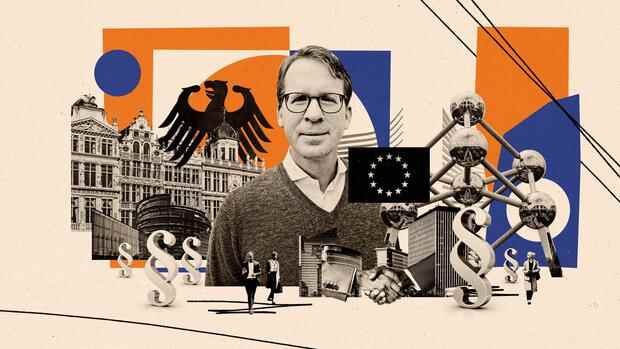Every week Moritz Koch, head of the Handelsblatt office in Brussels, analyzes trends and conflicts, regulatory projects and strategic concepts from the inner workings of the EU. Because anyone who is interested in business needs to know what’s going on in Brussels. You can reach him at [email protected].
As a former US Secretary of State and a presidential candidate who failed largely due to Russian electoral interference, Hillary Clinton has experience in dealing with despots – which is why her judgment on Mark Zuckerberg and Facebook should be taken seriously. Zuckerberg cultivated “authoritarian” views, complained Clinton last year, and negotiating with his company was like confronting a “foreign power”.
Usually, the US is quick to come up with a containment strategy when it thinks it is facing authoritarian challengers. But when it comes to Facebook, recently renamed Meta, the Americans act helplessly. It is up to the EU to draw up a containment doctrine.
The revelations of the Facebook files and the hearing of the whistleblower Frances Haugen in the EU Parliament underline the urgency of putting a stop to the profit-making pursuit of online giants where the climate of opinion is poisoned and democracy is endangered.
The EU has the opportunity to shine as a regulatory avant-garde – and to solve a problem that other democratic countries have so far failed to address. “The world now expects leadership from the EU,” the tech critic Shoshana Zuboff recently warned in the Handelsblatt.
Top jobs of the day
Find the best jobs now and
be notified by email.
But what Europe is currently offering the world is a bit of a glamorous squabble. The EU Parliament threatens to overload the Commission’s reform proposal with ever new requests for changes. So far, the federal government has also played a rather inglorious role in the search for a compromise.
Already monitor algorithms
The Digital Services Act (DSA), as the Platform Containment Act is called, aims to impose duties of care on online networks. A core idea is not to just monitor the published content after it is already spreading around the world. But to control the algorithms that decide which voices are heard on the network and which are not.
But the details are complicated. Haugen’s large-scale appearance in the EU Parliament hides the fact that the MPs are unable to find a unified position. The reform is being discussed in three committees, and little is progressing.
The basic idea is convincing: For companies like Facebook, which generate their income primarily with ads, the attention of their users is the most important asset. That means: Everything that excites is particularly profitable – and the inclination of platform operators to take serious action against hatred and propaganda is correspondingly low. Changing this incentive structure is the main objective of the DSA, at least that is how the experts at the Commission envision the matter.
One would think that Germany, which sees itself as a pioneer of online regulation, supports this idea. But for a long time the federal government hindered the Brussels deliberations. She was bothered by the fact that the Commission’s draft DSA does not stipulate which content should be deleted and how quickly – unlike the German Network Enforcement Act (NetzDG).
Who will enforce the rules?
Berlin insisted on an “opening clause” that would have allowed national regulations to continue to apply if they exceeded the “level of protection” of the DSA. The outgoing federal government seems only now to be aware that such an opening clause would allow right-wing populist countries such as Poland and Hungary to have unpleasant content removed, for example by opposition members or independent media.
Whistleblower Frances Haugen calls for stricter regulation of Facebook
Perhaps the most important question will be who will enforce European rules. National Authorities? The foreseeable result would be a regulatory patchwork quilt. The EU Commission? There are doubts about independence here.
The only thing left is the proposal to set up a new authority. This deserves the support of the future traffic light government. Containment requires effective institutions. Platform oversight would be the right answer to the systemic risks posed by large online networks.
More: Europe wants to declare war on Facebook and Co. – but Germany is not going along

